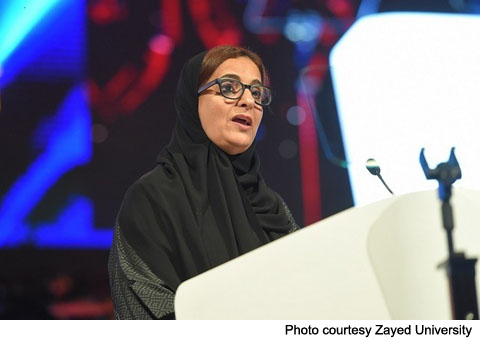ID :
408635
Fri, 06/03/2016 - 10:34
Auther :
Shortlink :
https://oananews.org//node/408635
The shortlink copeid
Sheikha Lubna makes the case for tolerance

ABU DHABI, 2nd June 2016 (WAM) --- " The UAE, as an incubator of multiple cultures and nationalities, is a perfect venue to experiment and demonstrate what tolerance might look like in practice," according to the Reverend Andrew Thompson, the chaplain of St. Andrew's Anglican Church in Abu Dhabi.
Reverend Thompson, who accompanied the Minister of State for Tolerance, Sheikha Lubna Al Qasimi, on her visit to Pope Francis in Rome last week, noted, in an article for The National, that she had "emphasised her commitment to providing and assisting freedom of worship for religious minorities in the UAE."
At an earlier meeting in Denmark, he said, Sheikha Lubna had highlighted the UAE's current strategies on tolerance.
"This involved highlighting the work of the Hedayah Institute, which is at the front line of combating extreme religious violence; the Government’s commitment to interfaith dialogue; and investment in key academic institutions and scholars committed to promoting an Islam that is moderate and responsible," he wrote.
The full text of Reverend Thompson's article follows.
Sheikha Lubna makes the case for tolerance on the world stage The appointment of Ministers of State for Happiness and Youth excited a lot of comment in the international media. As a religious leader, I was more intrigued by the concept of a Minister of State for Tolerance. What does that mean and how will it be executed? This week I had the privilege of travelling to Copenhagen and Rome with Sheikha Lubna Al Qasimi, who is the newly-appointed Minister of State for Tolerance, and Dr Farouk Hammada, the (Abu Dhabi) Crown Prince’s Adviser on Religious Affairs.
Sheikha Lubna is no stranger to pioneering roles. Ten years ago, she was the first woman to be appointed to the federal cabinet and she has been blazing a trail ever since. In her new role, Sheikha Lubna brings her trademark confidence and intelligence to promoting the value of tolerance not just as part of the country’s cultural ethos but also to engage in the global conversation.
In Copenhagen, we were hosted by the Danish Parliament for an opening session that featured theories and practices for combating extremist ideology. The Danish-Arab Consortium provided a platform for Sheikha Lubna to outline the UAE’s current strategies. This involved highlighting the work of the Hedayah Institute, which is at the front line of combating extreme religious violence; the Government’s commitment to interfaith dialogue; and investment in key academic institutions and scholars committed to promoting an Islam that is moderate and responsible. Sheikha Lubna also told the audience about the anti-discrimination laws that were passed in summer last year.
The crux of the debate in Denmark is the question of whether the ideology and violence of ISIL is sociologically different from any other ideology that promotes terrorism as a tool. Reference was made to the IRA, the Red Brigades and other groups that have made their presence felt in European history.
Is there anything particularly special about ISIL and its ilk? The answer seems to be no. The main drivers of extreme religious violence are diverse and multifaceted, ranging from employment opportunities, poverty and – a particularly strong indicator – exposure to violence. The influence of ideology and religion, while acknowledged, appear to be overrated.
Nevertheless, religious leaders were challenged to engage in local interfaith initiatives that would provide an antidote to the politics of fear – namely in the form of relationship-building and educational enterprise. In short, religious and community leaders are necessary to promote the value of tolerance. Several case studies were presented and practitioners of community building introduced their projects.
From Copenhagen we flew to the Vatican in Rome, where Sheikha Lubna’s diplomacy emphasised her commitment to providing and assisting freedom of worship for religious minorities in the UAE. A private audience with Pope Francis was the climax of an intense four days.
We were there to celebrate a Vatican-sponsored education project in which students from the UAE gave presentations in front of the pope and a large audience. The main theme of the project was to bring young people together from around the world to introduce them, among other things, to the value of tolerance. The conviction underlying this scheme is that it is never too early to start instilling globally cherished values such as mutual respect into our young people.
The overwhelming impression for me listening to several experts and global leaders speak on the subject of tolerance is that it is such a simple value, so simple that young children understand it, and yet it is so elusive.
With the rise of far-right nationalist parties in Europe, the divisive campaign by Donald Trump in the United States and extremist groups such as ISIL rampaging in the Middle East, the need for champions of tolerance is greater than ever.
In this task, the UAE has a worthy advocate in Sheikha Lubna. The UAE, as an incubator of multiple cultures and nationalities, is a perfect venue to experiment and demonstrate what tolerance might look like in practice.
The Reverend Canon Andy Thompson is the chaplain of St Andrew’s Anglican Church in Abu Dhabi and author of Christianity in the UAE: Culture and Heritage. – Emirates News Agency, WAM - http://www.wam.ae/en/news/emirates/1395296259818.html





